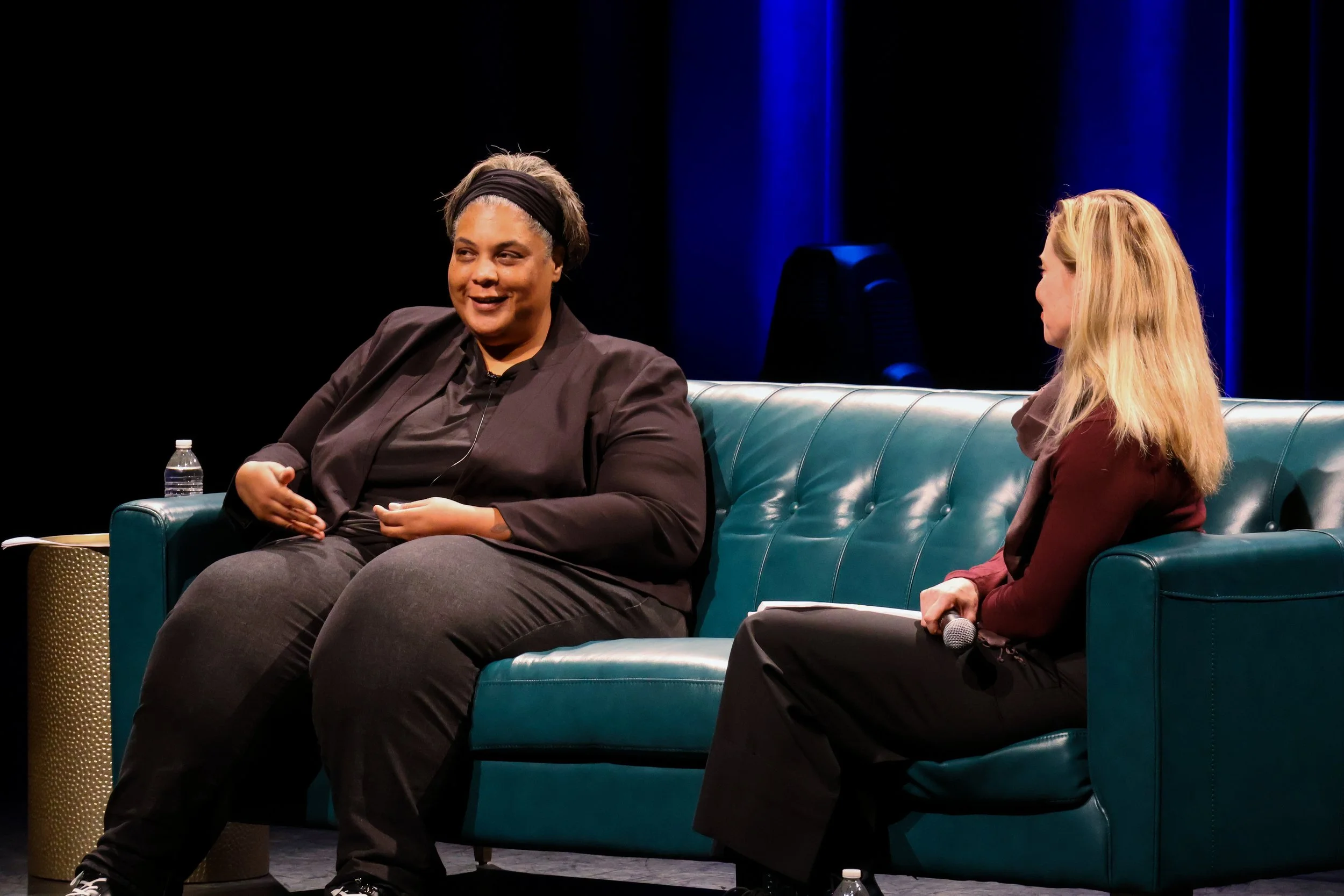Dangerous Ideas: Roxane Gay on feminism, freedom of speech, racism
Photo Courtesy of Ava Brandt
Roxane Gay, a writer, professor and activist used humor and relatability to discuss dangerous ideas, cancel culture and the responsibilities of speech at the "Engaging the World: Leading Conversation" keynote address and book signing event held at Musco Center main stage on Wednesday, Sept. 25.
Gay, the author of “Bad Feminist” and the collection of short stories, “Difficult Women,” opened with an amusing story of the first time she ever tried edibles. She prefaced the audience with her inexperience of drugs and how she held off until marijuana was legalized.
Gay shared she was consumed by paranoia and fear, leaving her with no other option but to tie herself to the bed and call 911.
“I spent two nights there (the hospital) and when I left I was still high,” she said, recounting the event.
Gay went from talking about several remarkably hot firemen to addressing the issue of Black male incarceration for marijuana offenses. She admitted the use of marijuana was not for her, but identifies as an advocate for the substance.
The personal anecdote showcased her unique writing style. She managed to draw on humor from her own experiences, while also recognizing the complex implications of weed for Black men and women.
Abby Badrick, a senior creative writing major, said she was unfamiliar with her work and the opening set a good tone for the rest of her speech.
“My favorite part of the presentation was the opening. It felt authentic,” said Baderick.
Miles Gaskin, a senior journalism major, said he liked how she chose a topic that related to college students.
“I was honestly expecting to be a little bored, but she did a great job keeping her audience entertained,” said Gaskin.” The story about the edibles caught my attention.”
The later half of her presentation was focused on “dangerous ideas” and freedom of speech.
Gay started by sharing how a man named Martin, whom she described as racist and misogynistic, had stalked and threatened her. She used humor to address the topic.
“I remember why I had blocked him,” Gay said. “He was ugly.”
Despite the humorous approach to this experience, Gay also recounted the fear and frustration she felt.
“I was more aware of my mortality than I ever have been,” she said. “I didn’t want to resign myself to his poor behavior.”
Zoe Rosenblum, a senior public relations and advertising major, said Gay’s persistence resonated with her.
“As a queer woman, I need to stand firmly in areas where I deserve my respect. She made me realize that if someone’s opinion on queerness is discriminatory towards me, then I deserve better regardless of who they are to me,” said Rosenblum.
Gay used the story about her stalker to transition to the topic of freedom of speech and the danger of speaking publicly as a Black female writer on social and political topics.
“Even my opinions have opinions,” she said. “We believe what we believe down to the marrow of our bones.”
Gay presented a series of her opinions under the title “Dangerous Ideas.” A summary of the list includes: quality for women, autonomy, saving the planet, health care, gender identity, freedom to love and marry, human dignity, eliminating more billionaires and shaming racists.
Students had mixed opinions regarding Gay’s statements. While some said they connected to her ideas, others said they were inconsistent.
Badrick said she felt her discussion lacked a central theme needed to be more solidified.
“At times it felt that there wasn’t one consistent topic throughout the talk,” said Badrick. “I think the talk could’ve been promoted differently to being about her as an author rather than about specific topics.”
Brian Guevara, a senior journalism major, questioned what Gay’s big takeaway was.
“The presentation itself was very entertaining,” he said. “But what did I actually get out of that?”
Guevara said he felt the edible story took up most of the time, whereas she only briefly touched on the other topics.
Rosenblum commented on the idea of feminism presented as a “dangerous idea.”
“I loved the example she gave of how feminism is just the bottom line equality,” said Rosenblum. “How can you not agree with that?”
The final thing Gay focused on was freedom of speech and navigating discourse.
She spoke on the political divide and the problem that arises when ideas and beliefs are so fragile they cannot be challenged.
“Everyone was talking and nobody was listening,” Gay said. “Either we are entirely aligned or in opposition.”
She highlighted the responsibility of speech and connected it to cancel culture and the importance of holding people accountable. Gay illuminated the difference between dangerous ideas and endangering rhetoric, one actually causes harm.
Guevara said he shared her take on cancel culture.
“I liked what she was talking about with cancel culture and how it should be more like consequence culture,” Guevara said. “I feel like the terminology has kind of lost a lot of its meaning, and she brought it back to what it should be.”
Badrick said she was inspired by Gay’s devotion to her writing style rather than appeasing an audience.
“I would say my biggest takeaway was to not sacrifice your writing or prose style for an audience,” said Badrick. “She reiterated that for a writer, you cannot create your readership, the community who connects to your work will find you as long as you remain authentic to your stories.”
Gay addressed a range of significant issues, but wrapped up the discussion by advocating for people to find a common ground among differences, dropping the mike, literally.

